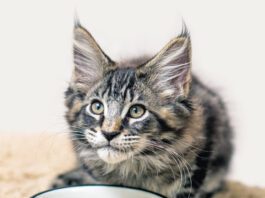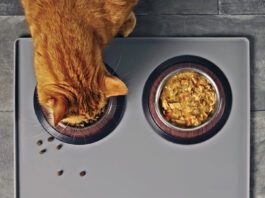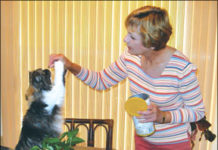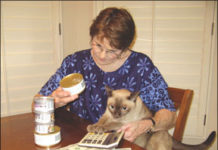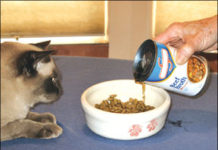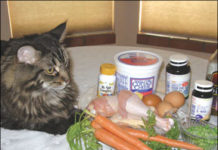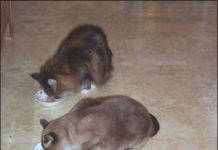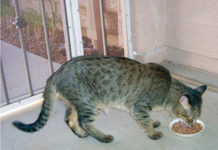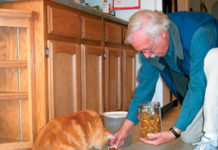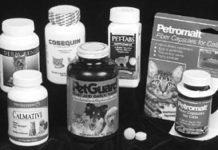Treats: Don’t Overdo It!
A fine way to show your deserving cat that youre a wonderful human being is to give her a delicious treat now and then - a scrap of baked salmon, for example, or a tiny slice of chicken from your dinner plate. Or perhaps youll unwrap a new pack of its favorite commercial snack - a chewy chicken-flavored tidbit that you discovered on the shelves of your local grocery store. This give-and-take interaction with your cat is perfectly all right, says Francis Kallfelz, DVM, a professor of veterinary nutrition at Cornell Universitys College of Veterinary Medicine, as long as you practice it in moderation and with appropriate vigilance. "The main reason that cat owners give treats is to enhance the human-animal bond," he says, "and there is nothing inherently wrong with that. In fact, theres a good chance that offering treats now and then will make your cat more responsive to you." He points out, however, that any treat should be considered a component of a cats overall daily diet and that, of course, it should be a substance that is safe for feline ingestion. Also, he advises, "Be sure that your cat doesnt become so addicted to treats that it starts refusing to eat its regular food."
The Rising Cost of Pet Food
Its no secret that gas prices are on the rise. So is just about everything else, including pet food. The U.S. Bureau of Labors Consumer Price Index reports that pet food prices for the second quarter of 2008 rose by eight to nine percent. While thats not as much of an increase as milk or gasoline, consumers are still seeing the most significant price increase in pet food in years. What gives?"If you look at the rising cost of pet foods, its all because of the cost of grains," says Joseph Wakshlag, DVM, PhD, assistant professor of Clinical Nutrition at Cornell Universitys College of Veterinary Medicine. "All of the grains such as corn and rice that are used to make pet food have gone up in price, so pet food prices had to rise as well. And that cost has to be passed on to the consumer." Pet owners like Teri Grohl have noticed. Grohl, an administrative assistant for a high-tech company, spent a portion of her $600 stimulus check on food and cat litter for her three cats, ages 12, six and two.
Feeding the Stressed Cat
Fires in California last fall caused more than 300,000 residents and their pets to flee their homes. This spring, an estimated 1,000 dogs and cats in Iowa, Indiana and Missouri were temporarily relocated or found stranded as a result of recent flooding in these areas. And dont forget Hurricane Katrina, which displaced an estimated 50,000 animals in 2005. A house pet that suddenly finds itself in a noisy, unfamiliar shelter, or worse yet, barely clinging to life from the peak of a rooftop, suffers from a high level of stress. Though your feline hopefully will never experience this level of stress, the physical responses to stress - whatever the cause - are similar. So, whether the cause of a cats stress is a catastrophic disaster or the addition of a new kitten into the home, much can be learned from those who routinely work with stressed felines and applied to our house cats - particularly when it comes to feeding and nutrition.
Homemade Diets: Use Care
You likely consider your beloved cat to be a truly unique creature, and in many respects she may indeed be one of a kind. When it comes to her dietary requirements, however, shes just like any other cat in the neighborhood - or in the world, for that matter. That is, all cats need a nutritionally sound and palatable daily diet, without which they couldnt possibly exist for very long, let alone develop their distinctively individual personalities. The lack of nutritionally complete and balanced food intake can result in a wide variety of disorders that can have lethal consequences if ignored. Daily consumption of a nutritionally adequate diet will not, of course, protect a cat from injury or from the onset of many systemic illnesses. But it is likely to supply the resources that an injured or sick animal needs in order to respond well to medical or surgical treatment.
Changing Your Cat’s Diet
If switching your cats food is warranted, be sure to do it gradually. For any number of reasons, you may feel that your cat could do well with a change in diet. If thats the case, contact your cats veterinarian for advice. Find out if switching foods is indeed necessary and will truly benefit your animals overall health. If your veterinarian recommends a diet change, you should make the switch gradually so that the cats digestive system can properly adjust to the new food. "Its good to offer your cat a bit of variety within each meal," says Ilona Rodan, DVM, director of the Cat Care Clinic in Madison, WI. "You can accomplish that by mixing two foods that have different shapes and sizes, or by blending canned and dry food. That will help prevent the animal from becoming fixated on one specific type of food, which is important in case a diet change is needed for medical reasons later in the animals life." Otherwise, Dr. Rodan says, cats dont really need more variety than that, and change merely for the sake of change is unnecessary.
Megacolon and Diet
A very clean litter box can be useful in prevention. But once diagnosed, your cat will likely need a specific dietary regimen.
A Diet to Help FLUTD
Feline lower urinary tract disease is a serious condition. Your cats veterinarian can recommend food to manage it best.
Essential Fatty Acids
Are they Essential For Your Cat?
Nutraceuticals
Some Call Them Unsafe and Unproven; Others Say Theyre Natural and Effective
Dietary Supplements: Are They Necessary?
Good nutrition is vital to good health. Ideally, everything we need comes from our daily diet, but many of us pop vitamins just in...
The Facts on Fiber
Certain conditions do require extra fiber - but a well-balanced diet is enough for most cats.



